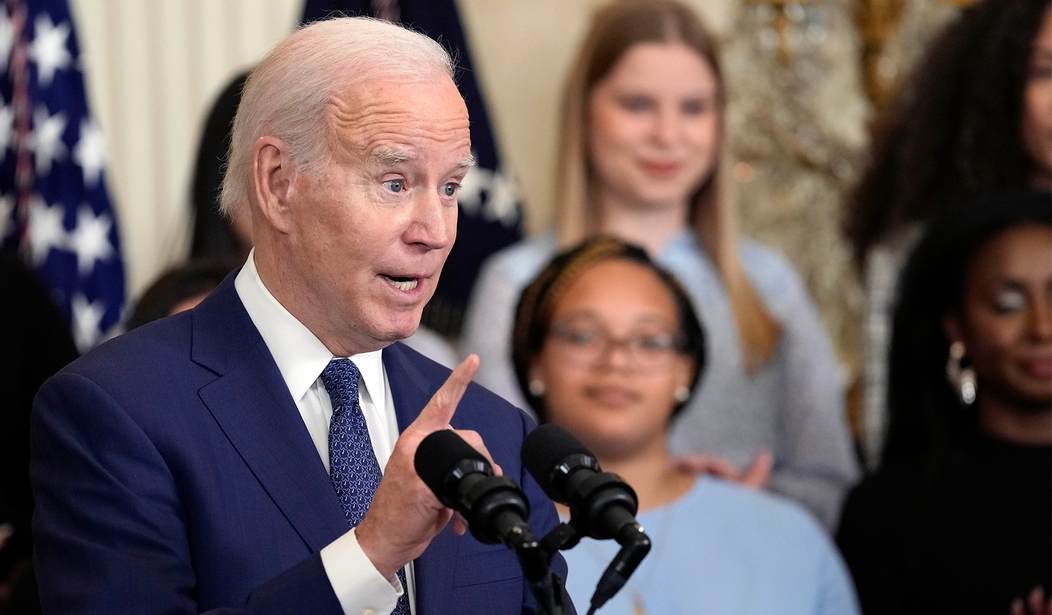President Joe Biden recently issued his first veto since taking office on Jan. 20, 2021.
Biden rejected a bipartisan bill that would have required investment fund managers to take politics out of their investment decisions and to stay focused on providing the best return to their clients as much as possible.
Why should you care? Because Biden was, in effect, saying it was permissible for fund managers, who have control of trillions of dollars in pension accounts, to take into consideration a company's ESG score (related to how it stands on racial justice, climate change and LGBT issues) when they decide where to invest the money.
Workers and retirees are angry about this decision -- as they should be. ESG is effectively a tax on your retirement funds, and it means you will have a smaller nest egg when you retire than if the money managers simply bought the top-performing stocks. Workers don't want politics diluting the returns on their 401(k) plans and other pension accounts.
Let's step back a minute. Social investment funds have been around for decades. I'm fine with it. As a matter of conscience, if people want to avoid investing in pro- or anti-abortion causes, divest from products made with child labor or avoid owning any fossil fuel companies, gun manufacturers, plastic companies or firms that don't have enough transgender bathrooms -- it's a free country. These funds normally underperform the market, but that's a decision of personal conscience.
I try to be a socially conscientious investor myself. I don't like the politics of Ben and Jerry's, for example, so I try not to buy their ice cream. But to be honest, I love their ice cream, so sometimes I give in to temptation. The Left tried to stage boycotts against Chick-fil-A because of some of the owner's social policy views, but the chicken sandwiches are so popular that the crusade failed miserably.
Recommended
But this new fad of ESG investing is entirely different and more nefarious. ESG stands for environmental and social justice governance. The idea is to promote racial equality, save the planet from climate change, and advance gay rights and a whole host of other related trendy and mostly left-wing causes.
ESG investing is perfectly appropriate when the investors are making their own decisions with their own money on where and what to invest in. But the scandal arises when fund managers that make investment decisions with other people's savings, or pension plans start injecting their own political biases into the investment portfolios and choose company stocks they should or shouldn't buy.
Fund managers, such as Fidelity and Blackrock, that pool their clients' investment dollars and pick (hopefully) high-performing stocks have what is called a fiduciary duty. They are legally required to get the best return they can. Their duty is not to save the planet.
Biden said in his veto message that ESG is good for investors and offers high returns to workers and pensioners. Wrong.
A recent analysis by Bloomberg found that last year, ESG funds (SET ITAL) severely (END ITAL) underperformed the market -- in some cases by well more than 10%. Many ESG funds were divested from oil and gas companies, even though Exxon, Conoco Phillips and others were among the highest-return stocks. In other words, if you bought the stocks that ESG funds sold, and sold the stocks that ESG funds bought, you'd have made a lot of money in recent years. And by the way, given that more than 70% of our energy now comes from fossil fuels, how does it advance our well-being as a nation by closing these energy sources down?
Another study by Boston College professors in retirement policy examined the performance of ESG funds and found "the average annualized return for those with a state ESG mandate would be 20 basis points lower than for those without a mandate."
My estimate is that ESG has cost the public billions of dollars of reduced returns on their retirement nest eggs. This comes atop the $30,000 or so that people have lost on average in their 401(k) plans after Biden came into office, and the combination of high inflation and lousy stock market returns overall.
The good news is that more than a dozen Republican governors are fighting back to protect pensions from "political influences." They are telling fund managers in their states that ESG is a violation of their duty to workers whose money has been placed in their trust. ESG should only be allowed with the explicit approval of the investor.

























Join the conversation as a VIP Member